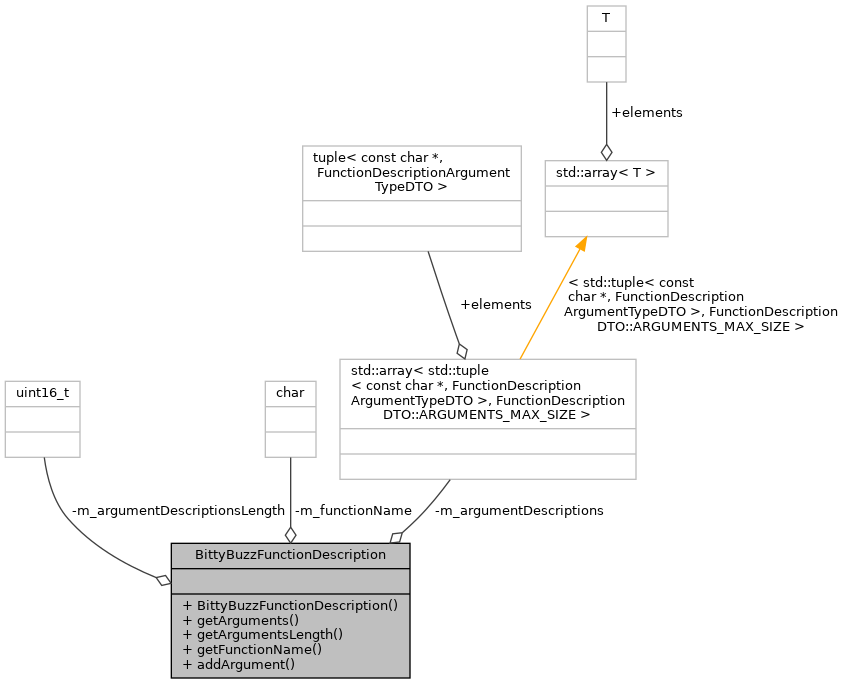Description for a function, used for the FunctionDescriptionRequest/Response. More...
#include <BittyBuzzFunctionDescription.h>
Collaboration diagram for BittyBuzzFunctionDescription:

Public Member Functions | |
| BittyBuzzFunctionDescription (const char *functionName) | |
| const std::array< std::tuple< const char *, FunctionDescriptionArgumentTypeDTO >, FunctionDescriptionDTO::ARGUMENTS_MAX_SIZE > & | getArguments () const |
| get the array of arguments description More... | |
| uint16_t | getArgumentsLength () const |
| get the length of the array More... | |
| const char * | getFunctionName () const |
| get the name of the function More... | |
| bool | addArgument (const char *argumentName, FunctionDescriptionArgumentTypeDTO argumentType) |
| add an argument to the list of the description More... | |
Private Attributes | |
| const char * | m_functionName |
| std::array< std::tuple< const char *, FunctionDescriptionArgumentTypeDTO >, FunctionDescriptionDTO::ARGUMENTS_MAX_SIZE > | m_argumentDescriptions |
| uint16_t | m_argumentDescriptionsLength = 0 |
Detailed Description
Description for a function, used for the FunctionDescriptionRequest/Response.
Constructor & Destructor Documentation
◆ BittyBuzzFunctionDescription()
| BittyBuzzFunctionDescription::BittyBuzzFunctionDescription | ( | const char * | functionName | ) |
Warning only the pointer is stored so make sure the functionName data lifetime is greater than the funciton description
Member Function Documentation
◆ addArgument()
| bool BittyBuzzFunctionDescription::addArgument | ( | const char * | argumentName, |
| FunctionDescriptionArgumentTypeDTO | argumentType | ||
| ) |
add an argument to the list of the description
- Parameters
-
argumentName the name of the argument Warning, the function description just keeps a pointer to the name, so make sure the data it's points to is valid during usage argumentType the type of the argument
- Returns
- true if the operation was successfull, false if not (no more space in the buffer)
Here is the caller graph for this function:

◆ getArguments()
| const std::array< std::tuple< const char *, FunctionDescriptionArgumentTypeDTO >, FunctionDescriptionDTO::ARGUMENTS_MAX_SIZE > & BittyBuzzFunctionDescription::getArguments | ( | ) | const |
get the array of arguments description
- Returns
- an reference to an std::array with the information stored
Here is the caller graph for this function:

◆ getArgumentsLength()
| uint16_t BittyBuzzFunctionDescription::getArgumentsLength | ( | ) | const |
get the length of the array
- Returns
- the length of the array
Here is the caller graph for this function:

◆ getFunctionName()
| const char * BittyBuzzFunctionDescription::getFunctionName | ( | ) | const |
get the name of the function
- Returns
- the name of the function
Here is the caller graph for this function:

Member Data Documentation
◆ m_argumentDescriptions
|
private |
◆ m_argumentDescriptionsLength
|
private |
◆ m_functionName
|
private |
The documentation for this class was generated from the following files:
- src/bittybuzz/include/bittybuzz/BittyBuzzFunctionDescription.h
- src/bittybuzz/src/BittyBuzzFunctionDescription.cpp
 1.8.17
1.8.17